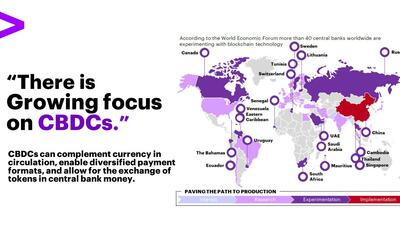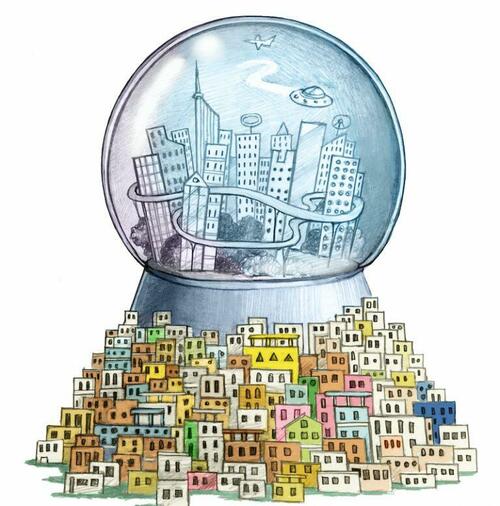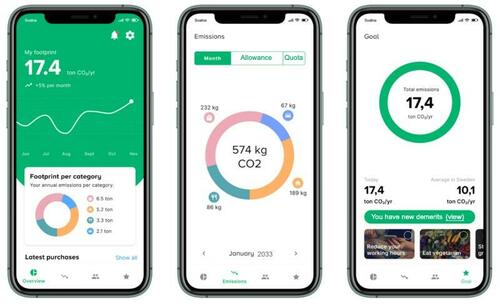Life In 2033: Monetary Apartheid

In the future, it’ll be a lot more expensive to be free.
Roger and Reggie were identical twin brothers, born in Merrickville, Ontario around 1980.
They both had normal school trajectories, even sharing an apartment through college – Roger taking computer programming and Reggie electronics engineering. The brothers seemed well positioned to enjoy reasonably affluent lives, having secured high-tech vocations in an increasingly digitized world.
They’re in their early 50’s now and it’s hard to say exactly where their lives diverged – this is not a “separated at birth” story. They were separated by something else.
Here in 2033, both of them are married – or least got married. Reggie’s wife left him in the late 20’s. She gave numerous reasons why “she couldn’t take it any more”, but statistically, financial stress overtook infidelity as the number one cause of divorce around the time of the first climate lockdowns.
Reggie ekes out a life of quiet desperation: he works as a remote drone repair / recovery technician, which has him licensed to drive a vehicle and his employer is allowed to operate seven months per year.
That leaves him on Yubey (“UBI”) for five months, usually in stretches of three and two months at a time, during which he’s confined to his fifteen minute city (a.k.a “fifdom”). By the end of it, he’s usually pretty gaunt – the caloric quota assigned to his body type, he always thought was a tad meagre. “And probably racist”, he often fumed, privately (he would never post that on a socnet, not again, anyway – he found out the hard way the first and only time he voiced his objections to his carbon allotment and feels he’s never quite earned-back those demerits, and probably never will – he laments).
He has visitation rights for his kids, but they live in a different fifteen, with their mother and a court appointed Parental 2. Even though it’s adjacent to his, he has to be careful around his travel allowance. The government finally approved OHIP coverage for MRNA syndrome, but the only practitioner he could afford was also in the adjacent zone, so he was left with either timing medical appointments with visitations or “saving up” by skipping one of his allowable excursions.
Reggie can’t afford to go to restaurants, and live entertainment in his socio-economic strata wasn’t much to write home about. Musical instruments aren’t approved for power usage in his fifdom and he was never much into acoustical folk music. So he spends most of his time at home, a fully subsidized basement bachelor, and most of his time there in his pod, wireheaded in a semi-sonubulistic state, immersed in a combination of pornographic fantasies and electrically induced opioid-like highs.
He never talks to his brother, he couldn’t pay for the stream even if he wanted to. “Off quadrant my ass”, he thought. May as well be off planet.
Roger, (and family), live in El Salvador. In the winter, anyway. Most winters. Sometimes Costa Rica. During the Northern spring and summer he keeps a residence in Texas and his main business operates out of Bermuda, inasmuch as it is tied to any physical location. It’s really just a holding company for his multiple income streams, royalties and investments, and it could really be anywhere.
School for the kids isn’t a problem because the tutors just travel with the family. The carbon taxes on private jets are excessive, to say the least, so they make due with a fractional. Pretty well everybody does. Sometimes they have to adjust their travel times by a few days or even a week – and if they’re flying when there’s a lockdown on then it’s even more expensive to shell out for an “ETE” (Essential Travel Exemption), but for the most part they make it work.
Roger isn’t overly ostentatious with his choice of cars, private vehicle ownership being a luxury unto itself; but he and his wife like to dress well, travel well, and overall, live well. That includes (like most SovInd’s), eating meat – real meat, not the lab hatched sludge (a.k.a “carcinogen in a can”) – whenever they feel like it, which is every meal. It’s expensive, all those carbon debits, but it’s no worse than the sales and income taxes of yore.
He hasn’t heard from his brother in over a decade despite having sent emissary agents out to establish contact with him years ago, but Reggie doesn’t seem to have access to any AI or encryption at all.
What was The Great Bifurcation?
How did the two brothers’ lives go in such different directions and reach such starkly different outcomes after starting out life in exactly the same place, having almost identical upbringings, educations and opportunities?
Near as Roger could figure it, it had to have been around the fourth Bitcoin halving. Roger had been dollar-cost averaging sats since 2021 – started buying right at the top of that cycle, as luck would have it, but he remained undaunted in his conviction. Having read The Bitcoin Standard and then The Fiat Standard, when he finally picked up a copy of The Sovereign Individual, it exploded in his brain and he was never the same again.
When the Great Restructuring was declared, after a month-long banking holiday across the entire G-20 nation states, the entire world bifurcated into a type of monetary Apartheid. Everybody and anybody who’s entire net worth consisted of banking liabilities found themselves ten times “richer” at least in nominal terms – their deposits having been converted into IMFCoin at the rate of 10-to-1.
But all the wallets were the same: you had to enter your medicals, link in your shopping apps and pretty well anything capable of an e-commerce transaction – they were now all reporting each transaction via the Basel API and people started seeing tabs for “Allowance” and “Quota” showing up in their wallets.
Roger wasn’t surprised, he’d been expecting it, and he took this as his cue to pull up stakes and move himself, his family – and his wife’s mother to El Salvador. They had owned a vacation house there for some time. Bitcoin’s market cap had entirely replaced that of bonds, and gold added another half on top of that. Buying at the top of the 2021 cycle now looked like a rounding error, thank god.
He tried to talk to his brother about dollar-cost-averaging into Bitcoin during that same cycle. Reggie would have none of it. Pointing at the FTX, Tether and Binance scandals, he dismissed it all as magic internet money and put his entire savings and RRSPs into “clean tech”, ESG ETFs and government bonds, a worse combination no-one could have ever imagined. By the time the Restructuring ran it’s course, a full blown depression wiped him out. He reverse mortgaged his condo, and after real estate tanked, he was even underwater on that – his wife took the kids and left, and he was evicted.
All he had from that point on was whatever showed up on his phone each month, which he had to spend before the next stim hit (on allowable expenditures, of course). It actually didn’t matter whether his monthly top-up was from his work or from his Yubey – it was all the same. It was more of a score than money. Just a number on his phone that decremented anytime he did anything, his entire life having been gamified in a weird, Kafka-esque manner.
Roger couldn’t understand how anybody could have been surprised by any of this. It wasn’t some big, closely held secret. Central banks, the IMF, the World Bank, the Bank of International Settlements had all been publishing white papers spelling everything out for years (he had been tracking it via his subscription to The Bitcoin Capitalist and its “Eye on EvilCoin” section in every edition).
Even The World Economic Forum with their cartoonish mascot, Klaus Schwab had been telegraphing all this like something out of pro wrestling: the global financial system was imploding, the debt super-cycle was ending, and generations of living beyond ones means on government granted entitlements and borrowed money was coming to an end.
Everybody was going to have to get used to ratcheting down their standard of living, and by “everybody” it meant, everybody else: those who had no independent means of wealth who relied on the government for their economic sustenance. After a decade of rolling lockdowns and what looked like a controlled demolition of the middle class, that encapsulated huge swaths of the populace.
The pathway into digital serfdom was paved with years long mass public propaganda around a climate crisis and a purely fabricated new religion called “degrowth”.
By the time The Great Restructuring hit, it didn’t matter if the public really believed anymore. They only had to buy it long enough to become completely beholden to the system, and after that – they were locked in for perpetuity.
The exceptions were those who had preserved (and grown) their wealth, holding it in secured digital bearer instruments within the decentralized economy, and outside the legacy banking system.
This was an ascendant class of textbook Sovereign Individuals, who figuratively island hopped across various network states and crypto claves that were marbled globally throughout an otherwise collectivist, proletarian “paradise”.
Roger and his family were among this latter class. He knew the CBDC regime wouldn’t last forever, it would probably collapse in less than half the time it took for the fiat era to implode, but he also knew that the better way to navigate the Age of Collectivism was as a sovereign individual and not a serf. Whatever system arose on the other side of this, it would be far better to enter it with wealth, property, assets and mobility than with none of the above.
* * *
This is the prologue from my forthcoming book: The CBDC Survival Guide: Preserving your wealth, freedom and sanity in the coming Age of Collectivism. Due out this fall. Bombthrower list subscribers will get the CBDC Cheat Sheet Summary when it drops (and the Crypto Capitalist Manifesto while you wait). Get on the list here, and follow me on Nostr or Twitter.
You can cut straight to the The Bitcoin Capitalist and learn how to escape Crypto Communism here.
 “No F**king Way!” – Joe Rogan, Post Malone Slam US Government CBDC
“No F**king Way!” – Joe Rogan, Post Malone Slam US Government CBDC  The Global Rejection Of CBDCs
The Global Rejection Of CBDCs  PayPal Revisited
PayPal Revisited










